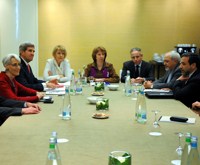In the aftermath of the negotiations on Iran’s nuclear program over the weekend, too much emphasis is being placed on the “failure to reach a deal” and not enough on the fact that leaving Geneva without a signed agreement represents not a breakdown, but simply a strategic and in all likelihood short pause. Furthermore, there has been very little precision as to what the deal currently being hammered out in Geneva represents. It would help if the word “interim,” “preliminary” or “confidence-building” were systematically placed in front of the word “deal,” as that’s what is under discussion for the time being.
The truth is that all sides, as well as close observers of the tortuous recent history of this stand-off, know what the final deal has to be, give or take a few details, in order to be both effective and acceptable to all the parties involved. What's going on now is an effort to talk everyone's guns back into their holsters so they can negotiate with more confidence, and under less pressure. In other words, the aim in Geneva is to set the parameters for an interim phase to allow Iran and the P5+1—the U.S., the U.K., France, Russia, China and Germany—to see if that final deal is possible.
This phase is crucially important, though, because the measures agreed to now will have a major impact in terms of the urgency each side feels to make concessions or, by contrast, the comfort they feel to walk away from a bad deal six months from now.

